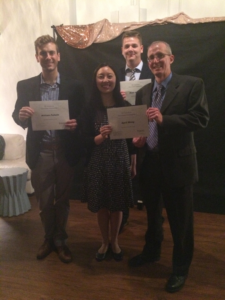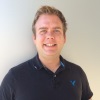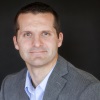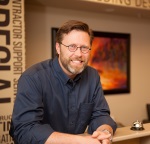26 Dec 2017
Using Structural Software Successfully
How well do you trust the results of your structural analysis software? Relying on software can save hours of design time, but using an inaccurate model can have devastating results. Even the most experienced engineer can stand to be reminded of potential inaccuracies when using structural software, especially with the many changes made to building codes and in structural software updates.
In the November 2017 SE University session, Matt Brown, SE, from Newport Structural Design, Inc., presented Validating Software Results which covered a variety of pitfalls to avoid and rules of thumb to use when employing structural software programs. Matt gave great examples of how small changes or oversights during the input can result in inaccurate and potentially catastrophic output.
First, Matt reviewed how designers need to be consistent in their use of ASD or LRFD loads and load combinations with the appropriate safety factors. For instance, the use of ASD loads with LRFD safety factors would result in an unconservative software results. Similarly, being consistent with ASCE7 wind speeds and load combinations and ensuring the correct code years. If a designer uses the 2005 wind speeds with 2010 load factors, the results would be unconservative. When multiple parties may be involved in the design, it is important for all parties to be aware of the applicable code year and be consistent throughout the design.
A second pitfall in using structural software analysis can be found in properly modeling the intended load path. Often times, the load path is incorrectly modeled with boundary conditions that may not be accurate. Being aware of how you would expect the building to transfer the loads down to the foundation before you solve the model will help to avoid unintended boundary conditions that would be inaccurate and drastically affect the analysis results.
Another common oversight in building models tends to result from the use of rigid diaphragms. When using collector beams to transfer lateral loads from the rigid diaphragm to the braced frame, the collector beam in the model will have zero axial load due to the strain compatibility of the idealized infinitely rigid floor compared to the less stiff steel beam. However, in reality, the steel beam will have an axial load that will need to be checked by hand in addition to the flexural bending obtained from the software results.
Also, notional loads could help prevent unconservative designs and should be included in any software input. This is especially important when using the Direct Analysis Method since the effective length factor K =1.0. Without any notional nodes on a simple gravity analysis, there is no deflection that will create a P-delta effect to include in the analysis. Thus, the frame will not be able to withstand any lateral load, even though the model shows the gravity analysis to be acceptable.
Knowing the capabilities of the software before employing its use can be invaluable to the design engineer. Though software does sometimes have bugs that can cause issues during design, typically errors result from a lack of foresight on what results should be expected from the model. To avoid future mistakes with your structural software analysis, be sure to watch out for these common pitfalls, and consider your expectations before you hit solve to be sure you have consistent results.
16 Nov 2017
Make a Difference this Holiday Season
Holiday office party? Pot-luck lunch? Secret Santa? We’ve all been a part of various traditions in the workplace, and the holidays are a great opportunity to take a break from the daily grind and spend time with co-workers in a more social setting. But what if we included some new traditions that will create lasting memories together and benefit our local communities, all while celebrating the various holidays we celebrate this time of year?
Here are some ideas for creating new office party traditions to improve the world around us:
- Host a winter clothing drive in your office. Bring in gently used winter coats or business attire to donate to organizations such as a local homeless shelter or Dress for Success. Get even more creative, and have each department compete to see who can bring in the most clothes to donate, and reward the winners with a company-sponsored free lunch.
- Begin an affirmation holiday card exchange! Everyone brings in a holiday card, which are then labeled with an employee’s name at the top. The cards are then passed to each of the other employees to write something positive and affirming about the subject employee. This may require some organization, but the effects will be long-lasting.
- Host an office-wide volunteer day. Select a local organization that could use some helping hands, and serve others with your co-workers. Groups such as Habitat for Humanity or local nursing homes or food pantries are always in need of additional help around the holidays!
- Compete for an extra day off – on the company! Let each department compete to see who can raise the most donations for a local charity, and the winners get an extra day off around the holidays!
- Holiday raffle for Toys for Tots. Collect toys to donate and pass out raffle tickets to employees for each toy they bring. Offer the winner an extra holiday bonus, or a special office perk for the upcoming New Year!
No matter how big or small, each workplace can do something together to make a lasting impact this holiday season, and it just might change your life as much as it benefits others around you!
In November 2017, Matt Brown, SE, from Newport Structural Design, Inc., gave a talk on Validating Software Results. He chose the North Bay Fire Relief Fund(https://www.redwoodcu.org/northbayfirerelief) for the SEU Speaker Inspires donation of the month.
Matt shared why he chose to support the North Bay Fire Relief Fund: “My reason for choosing this organization is that my own house came dangerously close to burning down during the recent California fires. It made me aware that just because you live in a dense urban area you are still not safe from wildfires, and I feel for the people of Santa Rosa who never knew that they should have to prepare for this, and who lost everything.”
Thank you, Matt, for helping structural engineers with your SE University session, and for your designation of the North Bay Fire Relief Fund as our SEU Speaker Inspires Organizations of the Month!
How do your relationships affect your attitude? When you are surrounded by positive personalities, do you find yourself looking forward to spending time with those people? When you have a connection to your community, whether it be your geographic, professional, or religious community, are you more likely to be engaged, and want to work hard to make it an even better place?
When stress in life might be getting you down, the fastest way to recovery is to surround yourself with positivity, and that includes the people you spend the most time with. When job burnout or employment stresses may be consuming your thoughts, having a confidante that can lend a sympathetic ear and support you through the crisis can make all the difference. Here are some simple ways you can build positive relationships to prevent or combat burnout:
- Invest in your closest relationships.
- Socialize more with your coworkers.
- Limit your time spent with negative people.
- Connect with a community group that shares your interests, such as a religious group, exercise class, or professional society.
If you feel as though you may be suffering from job-related burnout or stress, there are many resources available to help you back to a path of wellness. Long term burnout can affect every aspect of your life including your physical health. Building and maintaining positive relationships are one important step you can take to recover. For additional tips on improving a stressful work life, check out this helpful link to the MayoClinic or this link to HelpGuide.org.
Using post-installed adhesive anchors is commonplace in concrete construction and especially in renovations of concrete structures. However, field conditions can often dictate changes to the original design, and anchors are often relocated due to unforeseen circumstances. If you have been a design engineer for any length of time, you have undoubtedly encountered the situation where a hole was misdrilled, or the contractor is requesting to relocate the anchor due to existing rebar or or other conflicts. Having this happen on a project may lead to the question – What are the effects of the abandoned hole on the newly installed anchor?
In September 2017, Kevin Davenport, PE with Simpson Strong-Tie gave a presentation on Code Provisions for Post-Installed Adhesive Anchors into Concrete for SE University. Kevin reviewed recent changes in ACI addressing adhesive anchors and the new requirements for design engineers, as well as new mandates for installation and inspections. Kevin also responded to a variety of audience questions in reference to adhesive anchors, and the topic of anchor installation near mis-drilled holes was addressed.
Recently, Simpson Strong-Tie conducted several laboratory tests on adhesive anchors in tension adjacent to abandoned holes. These tests helped to provide some guidelines for design engineers when dealing with unforeseen field conditions such as misdrilled or abandoned holes near tension anchors. Kevin provided this memorandum from Simpson StrongTie which summarizes the results of the testing, and also provided this blog post which further describes each anchor and situation that was tested in their ISO 17025-accredited anchor testing laboratory in Illinois. Using these spacing and reduction factor guidelines, engineers can more accurately consider the effects of misdrilled holes and make appropriate recommendations when field conditions are not as anticipated.
In September 2017, Kevin Davenport, PE, from Simpson Strong-Tie, gave a talk on Code Provisions for Post-Installed Adhesive Anchors into Concrete. He chose both the Hurricane Harvey Relief Fund through the Greater Houston Community Foundation (https://ghcf.org/hurricane-relief/) and the Red Cross – Hurricane Irma Relief Fund (www.redcross.org) for the SEU Speaker Inspires donation of the month.
Kevin shared why he chose to split the donation between these two organizations: “When SE University informed me of the opportunity to donate to a cause, it came right on the heels of two natural disasters that hit close to home and affected many of my co-workers. My company has been contributing both through donations as well as by way of sending volunteers down to affected areas to assist with the recovery effort. So the first thing that came to mind was to select a cause that would continue to support in the recovery efforts for those devastated by these events in TX and FL.”
Thank you, Kevin, for helping structural engineers with your SE University session, and for your designation of the Hurricane Harvey Relief Fund through the Greater Houston Community Foundation and the Red Cross – Hurricane Irma Relief Fund as our SEU Speaker Inspires Organizations of the Month!
26 Oct 2017
“SEU Speaker Inspires” Organization of the Month: Habitat for Humanity – Capital District
In October 2017, Otto Schwarz, PE, SE, from Ryan Biggs | Clark Davis, gave a talk on Post-Tensioned Concrete Analysis and Design. He chose the Habitat for Humanity – Capital District (https://www.habitatcd.org/) for the SEU Speaker Inspires donation of the month.
Otto shared why he chose his local Habitat for Humanity: “I have been lucky enough to have the privilege of having a stable place to call home and the security of knowing that there was a place I could go to be safe and warm, and to prepare for each new day. This may not be the reason for my successes in life, but without it, I could have never made it this far. The ability to thrive and succeed in life requires a stable foundation on which to build, and many do not have that basic need satisfied. Habitat for Humanity fills this need for so many with the help of the work and donations of so many more.”
Thank you, Otto, for helping structural engineers with your SE University session, and for your designation of Habitat for Humanity – Capital District as our SEU Speaker Inspires Organizations of the Month!
25 Sep 2017
SE Solutions Provides Scholarships to 3 MSCE Structures Students from Purdue University (2017)
SE Solutions was pleased to recently present scholarships to three Purdue University Structures students to help defray the cost of their education. Máté Opoldusz, William Pollalis, and April Wang were the recipients of the awards. This is the sixth year that SE Solutions has offered the scholarships.

Purdue University MSCE Students and Scholarship Winners William Pollalis (left), April Wang (middle), Máté Opoldusz (back), and SE Solutions, LLC President, Brian Quinn
Máté Opoldusz received his BS degree in civil engineering from Budapest University of Technology and Economics in Hungary. He completed his MS in Structural Engineering at Budapest University of Technology and Economics in June 2017, where he conducted research into the design method development of seismic resistant rocking structures. He received a Fulbright Scholarship for 2016-2017 academic year to pursue MSCE at Purdue and he is planning to graduate in December 2017. Máté is working as a Graduate Teaching Assistant for the reinforced concrete design class. Upon his graduation, he hopes to find work at a structural engineering firm near California doing building design.
William Pollalis received his BS in Civil engineering from Purdue and will be completing his MSCE this December (2017). He then plans to continue at Purdue, pursuing a PhD. He is currently conducting research on lap splices in reinforced concrete shear walls susceptible to seismic events.
April Y. Wang received her BS in Civil Engineering from Purdue in 2016, and will complete her MSCE at Purdue in May 2018. She is currently working as a graduate research assistant focusing on the behavior and design of concrete-filled composite plate shear walls (CF-CPSW) for use in high-rise buildings, a project sponsored by AISC and the Charles Pankow Foundation. As a high school student, April enjoyed how physics could explain observable phenomena, but wanted to apply physics to leave a lasting, beneficial impact on society. She was drawn to structural engineering because buildings and bridges are beautiful, lasting solutions to the needs of communities, and they can only exist due to the structure behind the aesthetic finishes. April hopes to join a structural engineering firm after graduation and create beautiful solutions.
SE Solutions would like to congratulate each recipient and wish them future success in their fields of study as structural engineers.
21 Sep 2017
Disaster Relief – Engineers Can Help!
Our natural response to seeing our fellow Americans suffering through a natural disaster is, “How can I help?” But sometimes, that is about as far as we get. We might donate a few dollars to the Red Cross, or a religious organization that specializes in disaster relief, but we as structural engineers are uniquely equipped to be of help during disaster relief.
Recently, the National Council of Structural Engineers Associations website published How Structural Engineers Can Assist in Natural Disaster Relief Efforts. This page includes information on how you can be a part of future disaster relief efforts, and provides ways to keep up to date with specialized training seminars, including free webinars from the Applied Technology Council on the ATC-45 Field Manual: Safety Evaluation on Buildings after Windstorms. The Structural Engineer Emergency Response (SEER) Committee is active in the recovery efforts in Texas and Florida, and you could be positioned to help with the next crisis that may come our way.
Engineers seeking to help with the relief efforts in Texas can apply for a temporary emergency license by visiting the Texas Board of Professional Engineers’ website. Also, the National Science Foundation is encouraging submissions of proposals seeking to address the changes related to Hurricane Harvey.
Additionally, the National Voluntary Organizations Active in Disaster (VOAD) is a collective organization which draws together various groups who specialize in disaster response. These organizations are able to quickly mobilize and provide relief to individuals affected by these disasters. Different organization are active in different parts of the country, so check out their websites to see how you can volunteer through your local chapters or donate necessary supplies.
In August 2017, Ash Norton, from Ash Norton Engineering Leadership, gave a talk on Digital Presence for Engineers: What are Your Emails Really Saying? She chose the Kentucky Educational Television (https://www.ket.org/) for the SEU Speaker Inspires donation of the month.
Ash shared why she chose Kentucky Educational Television: “Some of my earliest memories were of watching Sesame Street and other programs on the local public broadcasting station – KET Kentucky Educational Television. Growing up in a poor family from Kentucky, my future was uncertain. However, the high-quality, educational programming that KET provided instilled in me an early love of learning.
This love of learning allowed me to excel in academics – graduating from high school a year early and ultimately earning degrees in chemical engineering and masters of business administration.
Now KET’s programming is diverse and innovative, while still maintaining commitment to its values of Learning, Excellence,and Community.”
Thank you, Ash, for helping structural engineers with your SE University session, and for your designation of Kentucky Educational Television as our SEU Speaker Inspires Organization of the Month!





